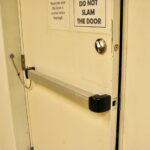For the last year or more, our industry has been dealing with legislation overriding the code development process in several states, with regard to classroom security. The use of politics vs. codes is not a new phenomenon, and we must be prepared for the possibility that it could continue to affect our industry. It’s best to know early on in the process that something is brewing, so please let me know if you hear of a potential legislative change in your state.
We need to learn a lesson from the continued impact of the opponents of home fire sprinklers. If you haven’t been following the situation, this is a great article:
Fire Fight – ProPublica
In the spring of 2012, U.S. homebuilders were celebrating a string of victories. In more than a dozen state capitals from Phoenix to Tallahassee, they had managed to block plans to require fire sprinklers in new homes.
Then came a threat from a place they thought was buttoned up: South Carolina.
It happened hours into a marathon session of the obscure council that sets state building codes. Some of the 15 council members who had gathered at the firefighters academy in the woods outside the state capital of Columbia already left for home. Late into the night, the state’s fire marshal, Adolf Zubia, somehow persuaded a majority of those remaining to support sprinklers by a vote of 6-3…
Click here to continue reading this article.
Graphic: Shutterstock.com/Jag_cz
You need to login or register to bookmark/favorite this content.







There is a thin line between taking input from industry representatives, and participating in quid-pro-quo. South Carolina is so far to one side they can’t see that line anymore. They’re not alone, of course.
If you’re receiving awards for being a friend of an industry, you probably should not be allowed to vote on matters relating to that industry…
See, I would come at this from a different angle. I’d offer home owners a reduction in their property tax and give insurers a tax break when they offer reduced rates when sprinkler systems are installed. Give the end user an incentive to request sprinkler systems from the builder, adding value to their home and saving them money over the long term.
How does the water flow rate required for a sprinkler system to be effective compare with the flow rate that is available at the meter in a typical residential setting? The commercial buildings I’ve seen with sprinklers invariably have pipes which are much larger than would be typical for residential plumbing.
Where do we draw the line with government intervention? Making sprinklers mandatory in singe family homes seems like it’s going too far. Sure, offer a tax incentive. But that “savings” has to be made up elsewhere. They aren’t giving without receiving.
Just like the “childproof” outlets/receptacles that are actually adult proof. I recently replaced all of them in a new home because they were IMPOSSIBLE to insert a 3-prong plug into. The builder said I just needed to push harder. The electrician said I need to push evenly and simultaneously with all 3 prongs. It turns out we were all too weak and stupid because they couldn’t do it either. I actually broke the outlet and the junction box trying to plug something in. That shouldn’t happen. Thanks government. Cost savings = none. I had to spend nearly $200 to buy all new old-school outlets and spend several hours replacing all of them.
I remember shocking myself as a child. I learned that scissors don’t belong in outlets. I think our government is trying to say that kids today won’t learn from their mistakes.
I can go on about water-saving faucets and shower heads too. If I want to take a shower and have water pressure that actually rinses the soap off my skin, I should be able to do so. I pay the water bill after all. Do you think that’s a waste of water for others? Sorry. What about all of the water I waste rinsing out bottles, jars, tubs, cans, etc. for the recycling bin? That’s OK because I’m recycling, right? I’m betting I waste more water doing that than the extra pressure I now get from modifying my shower head. I’m also betting the extra time I was spending trying to get soap off of me wasted more water than I use now. This planet is covered in water and I’m counting on someone figuring out how to make all of it more useful. Until then, I’ll enjoy my 5 gpm shower head in lieu of the regulated 2.5 gpm garbage that the government is dictating. And I’ll do it guilt-free.
My city is actually offering, for free, 1.5 gpm shower heads to those that bring in an old shower head. I can’t imagine what 1.5 gpm would feel like. I called and asked if I could buy the TWO shower heads that get turned in.
Just curious, what kind of pressure would come out of a spinkler head? If it’s 5gpm or more as some suggested in the comments below the article, by all means, put one above my shower stall and I’ll start my shower every morning with a long candlestick.